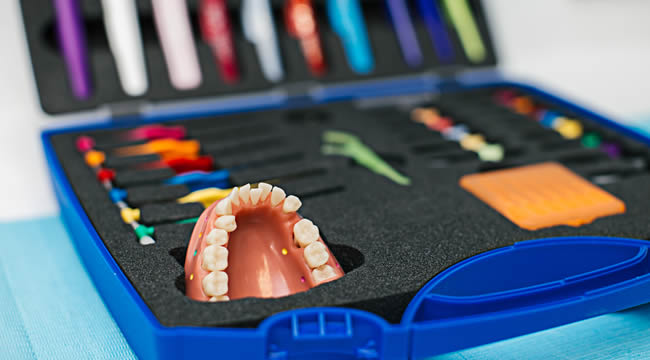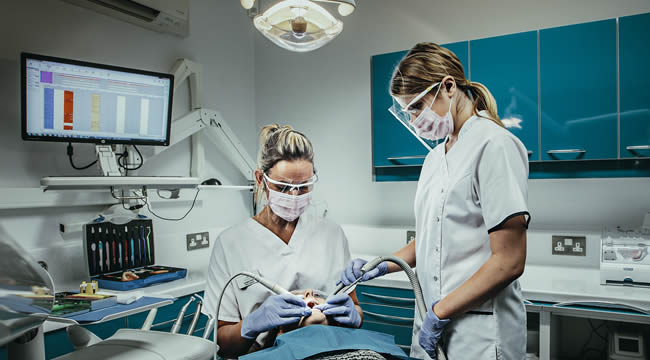Periodontics
Specialist Periodontics Service in Derby
Periodontics is the specialist area of dentistry which concerns the diagnosis and treatment of diseases of the periodontium, the tissue that surrounds and supports the teeth. Unlike a hygienist, a periodontal specialist can diagnose and treat gum diseases, whereas a hygienist is there to help implement treatment.
Periodontitis (a set of inflammatory diseases affecting the periodontium) itself can refer to a number of inflammatory diseases which, if left unchecked, can lead to the loss of the bone around the teeth and thereafter to the loosening and ultimately the loss altogether of the teeth themselves. A Specialist Periodontist uses a number of techniques to diagnose gum disease including x-rays, visual analysis and physical “probing” of the infected area.
The symptoms of periodontitis (“gum disease”) include swollen, red or even bleeding gums, halitosis, receding gums, loose teeth and gaps caused by the physical structures of the gums breaking down. Unfortunately, some of these symptoms actually occur painlessly which is why so many patients allow the disease to progress unchecked.
Given that periodontitis has been linked clinically to an increased risk of strokes, heart attacks, atherosclerosis and impaired mental capacity in the elderly, it is essential that patients showing early symptoms are referred to a Specialist Periodontist immediately.

Frequently Asked Questions
What is Periodontics?
Periodontics is the branch of dentistry concerned with the supporting structures of the teeth, and diseases and conditions that affect them.
What is periodontal disease?
Periodontal disease broadly includes gingivitis and periodontitis.
What is dental plaque?
Dental plaque is the creamy-white sticky substance that develops around your teeth and gum line. If plaque is not adequately removed it will harden to become a more resolute substance known as calculus or tartar. Toxins are released from plaque and calculus, which leads to inflammation of the gums and sometimes the bone, which holds the teeth.
What is gingivitis?
Gingivitis is inflammation of the gums in response to the bacteria in dental plaque. This is usually a reversible condition with effective advice and treatment. Although not always the case, long-standing gingivitis can progress into periodontitis
What are the symptoms of gingivitis?
Symptoms may include redness, puffy and swollen gums. Gums will often bleeding during tooth brushing or at other times.
What is periodontitis?
Periodontitis is inflammation of the supporting tissues of the teeth including the gums and progressive destruction of the bone surrounding the teeth. Left untreated, periodontitis can lead to loosening and subsequent loss of teeth.
What are the symptoms of periodontitis?
Symptoms may include red or swollen gums, bleeding when brushing or at other times, receding gums (roots become exposed and teeth begin to look longer), bad breath, aching itchy sore or tender gums. The teeth may have changed position gradually over time as they become loose, drift or protrude. Gaps may develop between the teeth as the gum recedes.
What factors contribute to periodontal disease?
Plaque is the main risk factor for periodontal disease but other risk factors are also involved. Smoking has an important role in the progression and severity of periodontitis. It also has a detrimental effect on healing following treatment.
Periodontitis can be passed on genetically, especially aggressive forms of disease. Patients with poorly/uncontrolled diabetes tend to have more severe periodontal disease.
Stress, Pregnancy, Puberty and certain medications are also risk factors for periodontal disease.
Treatment of periodontal disease
Treatment generally depends on the type of periodontal disease and how far the condition has progressed. Treatment is broadly divided into non-surgical treatment and surgical treatment.
Non-surgical treatment
Often, the early stages of periodontal disease are best treated with non-surgical treatment. One of first steps usually involves thorough oral hygiene instructions to enable you to take care of your teeth and gums effectively to give any treatment provided the best chance of success. The teeth will require scaling to remove plaque and tartar both above and beneath the gum line.
In periodontitis, more detailed procedure called Roots Surface Debridement is required to clean away tartar on root surfaces in deep areas below the gum line, under local anaesthetic. This allows the gum, which has come away from the tooth due to the disease process, to heal and reattach to the tooth. Following treatment you will be reviewed 6 to 8 weeks later (depending on your case) to assess your response to treatment and discuss any further treatment needs if necessary.
Surgical treatment
Severe cases of periodontal disease may require additional surgical treatment after non-surgical treatment phase. Non-surgical treatment is often important prior to surgical treatment to help improve the quality of the gum tissue and limit surgical treatment where it is only required.
Do I need a referral?
Your dentist is able to offer you general advice and basic periodontal treatment, however you may require more advanced assessment and treatment which can be assessed by a practitioner who has been highly trained in the field of periodontics. Following your consultation, you will receive a detailed report by post.
What will happen on my consultation visit?
You will receive a detailed periodontal examination and in-depth discussion of your condition. You should experience little, if any, discomfort during the examination. X-rays will be taken as required to evaluate the extent and distribution of bone lost around your teeth. Following appropriate investigations and once your diagnosis has been explained to you, you will be presented with all suitable treatment options for your consideration.
Other periodontal treatments
Other conditions of the gums often require special treatments/surgery. We also offer the following periodontal treatments:
- Crown lengthening
- Periodontal plastic surgery (including gum grafts)
- Gingival recontouring/gingivectomy
- Frenectomy
- Periodontal regeneration and bone grafting
- Ridge augmentation


Referring to our Specialist Periodontist for Gum Disease Treatment in Derby
Please see our dental referrals page for more details.
or
call our Treatment Coordinator direct on 01332 550933.

